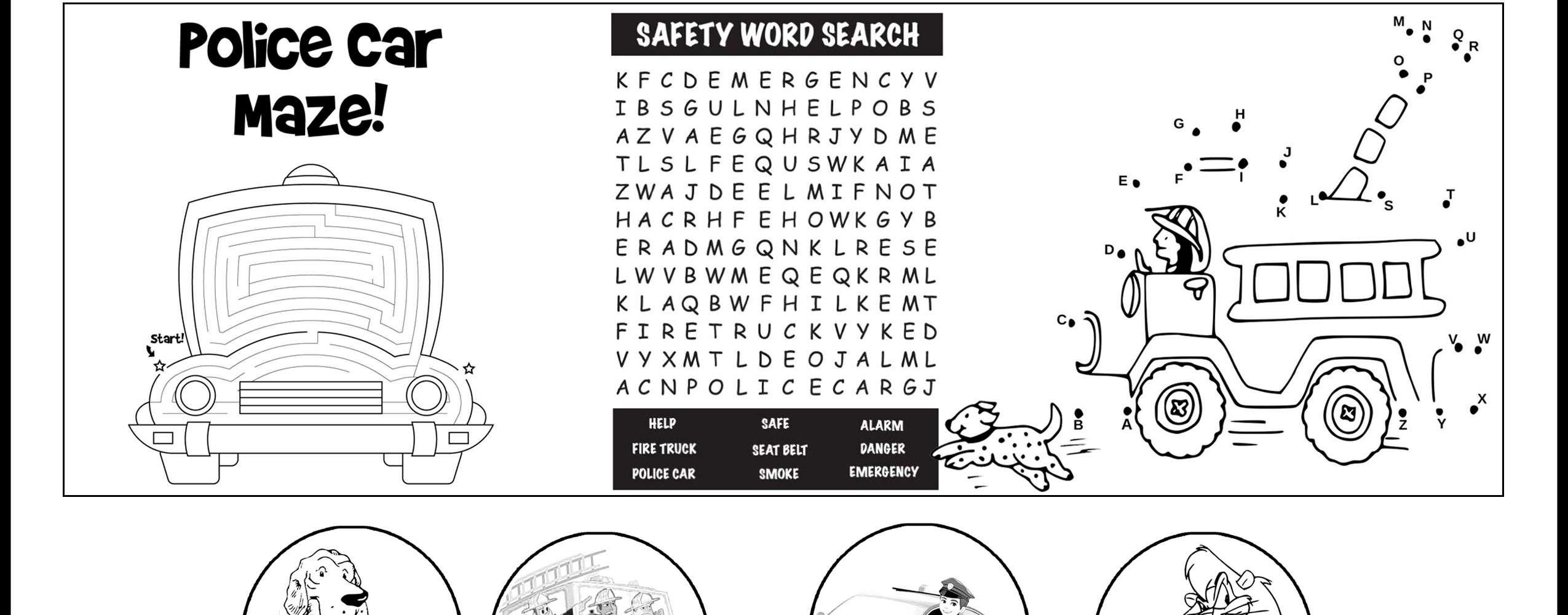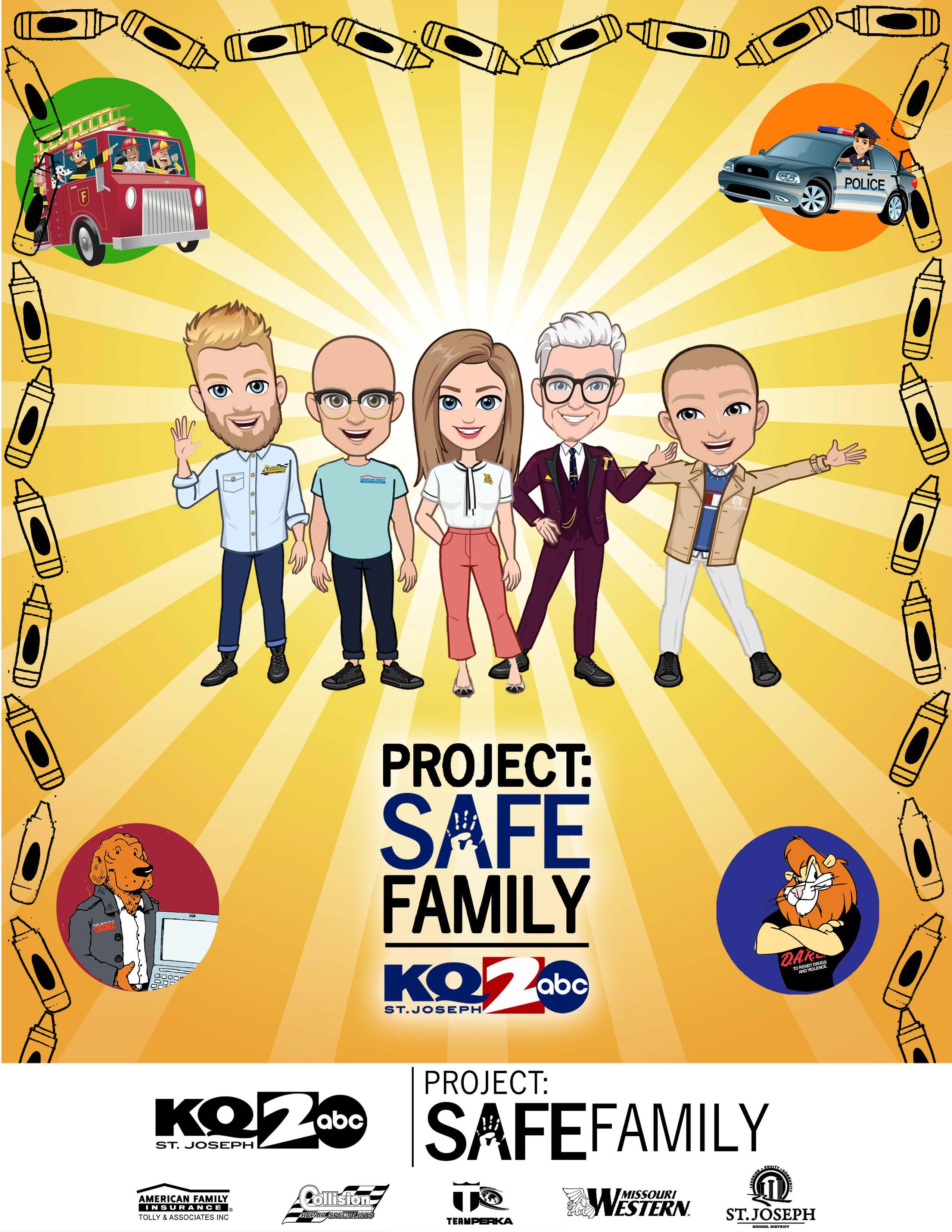

This Book Belongs To:
My Family Members Are:
Trusted Adults I Know:
(YourCalling for Help
You can dial 9-1-1 from any cell phone, home phone, or phone booth if there is an emergency. Remember NEVER call 9-1-1 from YOUR home if it is on fire! Have a trusted adult help
Color this 9-1-1 sign according to the key at the bottom of the page. Cut it out and place it near a phone in case there is an emergency.
Home Alone Safety
Do you stay home alone sometimes? Here are good safety tips you can talk over with a parent or guardian to see what works best for you and your family.
• If someone knocks at your door, DON’T ANSWER IT… even if they look friendly or wear a uniform, like a delivery person or cable worker.
• If someone calls and asks for an adult in the house… don’t tell the person there isn’t an adult home. Just say, “They can’t come to the phone right now. May I take a message?” NEVER tell anyone you are home alone.
• Lock up. Learn how to lock and unlock all the doors and windows. Always make sure everything is locked, even when you are inside.
• If you hear strange noises… ask a parent or guardian what the noises may have been. Talk about HOW and WHEN to call 9-1-1.
• Never cook by yourself. Always ask a grown-up first before using the stove, microwave, toaster oven, or sharp knives.
• Choose a Safe House. With a parent or guardian, ask a trusted neighbor if you can go to their home if you need help fast. This will be your Safe House.
• Be alert. Be aware of your home BEFORE you go inside. If something doesn’t look right, like a broken window or a door is open, DON’T GO INSIDE! Go to your Safe House and ask for help.
Fire Safety
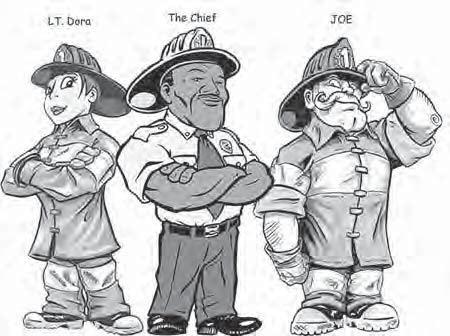
You know fires are hot. You know fires can be dangerous. Fires can also be very loud and scary. Let’s learn how you and your family can stay safe!
Draw the other half of the pictures below to help you remember that kids should never touch matches, lighters or candles.
Learn Fire Safety Basics
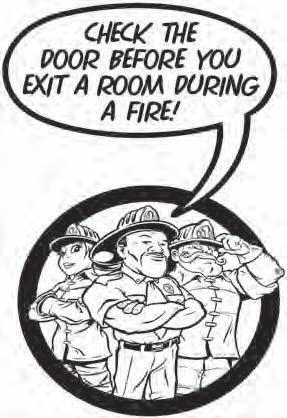
What will you do if there’s a fire in your home?
Have an escape plan.
Talk with your family about an escape plan. You should have two ways out — a Plan A and a Plan B — in case one way is blocked by fire.
Have a family meeting place.
Decide with your family where to meet outside, away from the fire.
Crawl.
Remember to stay close to the floor when moving. The smoke of a fire will rise to the ceiling. It will be easier to breathe if you are close to the floor.
Feel.
Always feel doors before you open them. A hot door means there may be fire on the other side. Try another way out.
Know how to open windows and doors. Have a parent or guardian show you how to unlock windows and doors in your home.
IMPORTANT! Get out first.
Stay calm and move quickly. NEVER look for your favorite things. You need to get out fast! Call 9-1-1 AFTER you get outside.
STAY outside. Stay outside — no matter what. NEVER go back into a burning building!
Practice what to do. As a family, have a fire drill. Practice your escape Plans A and B and know where to meet outside.
School Safety Follow These Rules and Get to School Safely!
DON’T FORGET!
Check with a parent or guardian about other special rules they have for you. 2
1 3 4

Don’t stop to talk to strangers! Never go anywhere with anyone you don’t know – no matter what they tell you.
While waiting for the bus, stand on the grass or sidewalk. Never walk behind the bus.
Stay with your friends. It is always safer in a group! Practice getting to your bus stop 5 minutes early so you won’t be left behind.
a-MAZE-ing Fun!
Can you find your way through the maze and arrive at school safely?
Follow traffic signals and rules for crossing the street. It is best to cross the street at crosswalks or at places where there are crossing guards.
(answers on page 41)
Reminder
STAY SMART!

Remember, never go with a stranger, or explore on your own.
STAY ON ROUTE!
Keep Away
McGruff the Crime Dog Says…
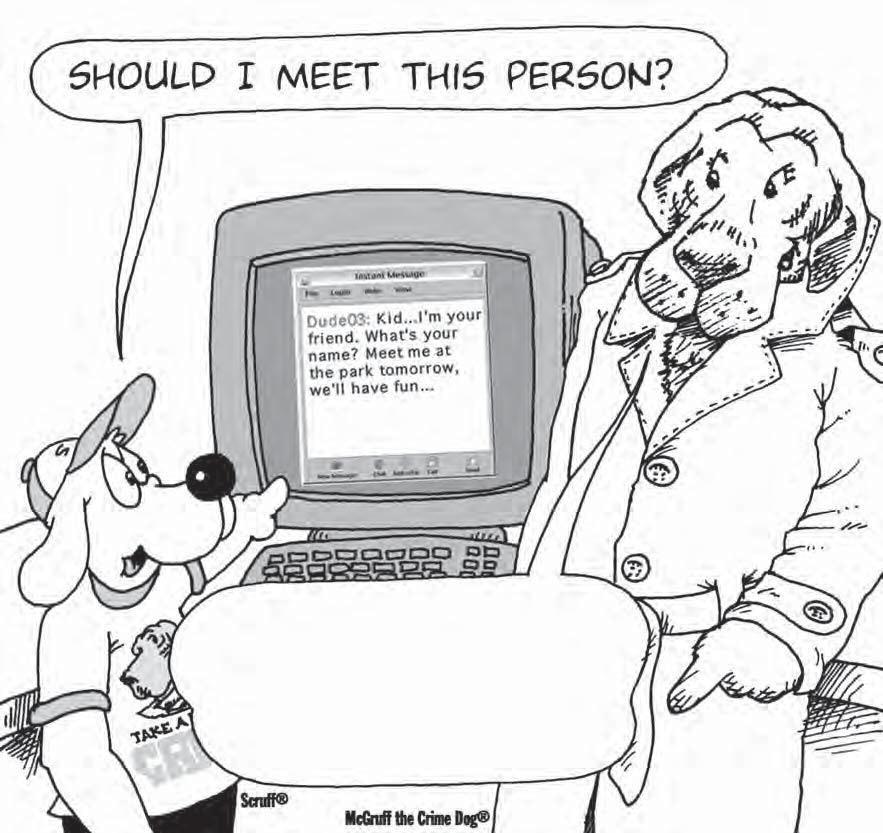
EVERYONE online is a STRANGER. You can never know who they really are –no matter what they tell you.
Talk only with people you know and NEVER MEET STRANGERS FACE TO FACE.
Keep Telling
The Internet can be fun – you can play games, learn a language, read a book and even listen to songs, but ALWAYS tell a parent or guardian if someone or something bothers you online.
Check with your parent or guardian about the computer rules in your home.
Below are some rules to follow when you are online. Check off the rules as you talk about them.
NEVER give out your name, address, or phone number.
NEVER tell where you go to school.
NEVER send a picture of yourself to strangers.
NEVER plan to meet someone from the Internet, face to face.
ALWAYS tell a parent or guardian if an email or something you saw online makes you feel uncomfortable, sad or angry.
KEEP all passwords a secret with your family.
Take the Pledge!
Complete the pledge below with the members of your family. Then cut out the pledge and hang it near your family’s computer.
Our Family’s Internet Promise
Keep telling each other about the things we do on the Internet.
Keep away from Internet strangers. Only talk to people we know.
Keep safe our personal information.
Keep the computer in a common area.
Keep our passwords safe. We never share them with anyone outside of our family.
Avoid pop-ups.
Use filters and other safety software. Update our anti-virus software often.
Scan attachments with anti-virus software before opening.
Other Rules:
Other Rules:
Signed:
Date:
We Signed the Pledge!
Draw yourself with your family members in the picture frame below!
Is There a Bully at Your School?
Bullies can tease you, call you names, push you, tell bad secrets about you and embarrass you. Bullies can be scary, mean and harmful. Some schools have anti-bully rules, which means bullying is against school rules.
REMEMBER : Always tell a trusted adult about bullies — no matter what! Read these safety rules with a parent or guardian.
• Try to Talk it Out. Say, “Why are you being mean to me? What have I done to you?”
• Speak Up. Say, “Stop picking on me!”
• Make a Joke.
If you say something funny, even about yourself, the bully might laugh and forget about picking on you.
• Walk Away From the Bully. That’s right — just turn around and walk away! You don’t have to put up with someone being mean to you.
• Stick with Your Friends.
• Tell an Adult about Bullies.
Cyberbullying
What is a cyberbully?
Cyberbullies use emails, instant messaging (IM), social networking sites and cell phones to say mean, embarrassing, or hurtful things about someone else.
What might a cyberbully do?
REMEMBER!

Be as nice online
A cyberbully might tell others embarrassing information about you or put photos of you online for everyone to see. They might also start rumors about you. It’s a lot like bullying that can happen at recess or on the school bus — and it can hurt just as much.
Protect Yourself From Cyberbullying
Follow these safety rules:
• Keep your passwords safe! You can tell your parents — but no one else. Not even your best friend!
• Don’t share secrets, photos or anything online you wouldn’t want the whole school to see.
• Have your mom or dad or a trusted adult help you set up your email and instant message accounts. Never include your name, age, address, or phone number in your profile or screen name.
• Don’t send messages when you’re angry. Wait until you cool off so you don’t say something you’ll regret.
• Let bullies know that cyberbullying is not OK. If your friends are cyberbullying, tell them it’s not funny and that cyberbullying hurts people.
• Be as nice online as you are offline.
Pretend the boxes below are your cell phone or computer screen. Read the incoming messages, then choose your response.
Incoming Message:
Luv2bullE: Ur IM profile doesn’t have any info about u?
Choose Your Response:
Me: Whoops! I’ll fix that now.
Me: I know. McGruff says u shouldn’t give out personal info online cuz strangers can read it.
Incoming Message:
Luv2bullE: I found a pic of Molly from last year. She looks so bad! I’m going 2 put it on my website so every1 can see!
Choose Your Response:
Me: Forward the pic 2 me and I’ll send it 2 every1 I know!
Me: U shouldn’t do that! I bet Molly has some bad photos of u 2.
If a Cyberbully is Bothering You:
•
Don’t respond to emails or messages that are mean to you or your friends.
• Don’t forward emails or messages that are mean or that spread rumors about other people.
• Don’t open emails or messages from someone you know is a bully.
• Block anyone who acts like a cyberbully.
• Save or print all messages from bullies.
• Show the messages to an adult you trust — like a parent or a teacher — and ask for help. If the first adult you tell doesn’t help you, keep telling until someone does.
Incoming Message:
Luv2bullE: Have u seen Nick’s website? All it does is make fun of Mike. It’s so kewl!
Choose Your Response:
Me: Why would Nick do that? That’s really mean.
Me: Nick is so funny.
Incoming Message:
Luv2bullE: I just found the password 2 Nick’s IM account. Wanna pretend 2 b him and chat with Melissa?
Choose Your Response:
Me: You shouldn’t do that! I’d b so mad if some1 did that 2 me.
Me: Why don’t u? Then tell me all about it.
Drugs and Staying Safe
Let Daren the Lion teach you about good drugs and bad drugs, and ways to stay in charge.
Dare to resist drugs and violence.
TORESISTDRUGS ANDVIOLENCE.
Stay Safe
Good Drugs: Good drugs are medicines given to you by your doctor or a parent or guardian.
You take good drugs to feel better when you are sick or to keep from getting sick.
What Daren the Lion says about Bad Drugs: Bad drugs could look like medicine from the doctor, cigarettes, or candy.
IF you find something and it could be a bad drug...
IF anyone offers you a bad drug...
…DO NOT TOUCH IT OR TAKE IT.
Tell a trusted adult right away.
Make Your Own Bookmark!
Carry Daren the Lion’s Drug Safety Rules
Wherever You go!
1. Color the front and back of the bookmark below.
2. Cut along the dotted lines.
3. Fold in half.
4. Then glue or tape the two blank sides together. Now you have your own Daren the Lion bookmark!
Daren the Lion Says:
TO RESIST DRUGS AND VIOLENCE.
TO RESIST DRUGS AND VIOLENCE.
WAYS TO BE IN CHARGE:
A. Avoiding the situation.
B. Strength in numbers.
C. Walking away.
D. Cold shoulder.
E. Saying “NO”.
F. Giving a reason or fact.
G. Changing the subject.
H. Repeated refusal, or keep saying “No”.
I. Say something funny.


